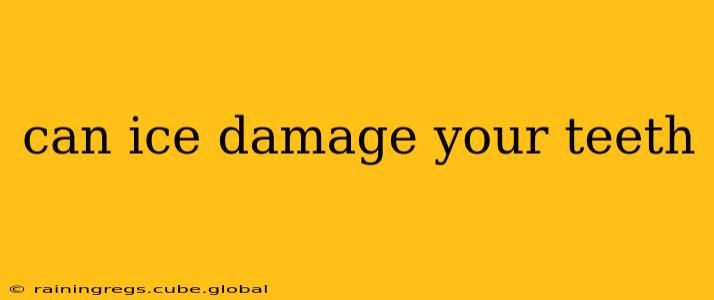Can Ice Damage Your Teeth? A Chilling Truth
The short answer is yes, ice can absolutely damage your teeth. While enjoying a refreshing ice cube on a hot day might seem harmless, the extreme cold can actually cause significant harm to your dental health. This article will delve into the ways ice can damage your teeth, explore common misconceptions, and provide tips on how to minimize the risk.
How Does Ice Damage Teeth?
The primary way ice damages teeth is through thermal shock. This occurs when your teeth are subjected to a sudden and extreme temperature change. The enamel, the hard outer layer of your teeth, expands and contracts with temperature fluctuations. Repeated exposure to extremely cold temperatures, like those from chewing ice, can cause microscopic cracks in the enamel over time. These cracks can weaken the enamel, making your teeth more susceptible to:
- Fractures: Larger cracks can lead to chipped or broken teeth, particularly if you have pre-existing enamel weaknesses.
- Increased Sensitivity: Cracks in the enamel can expose the dentin, the layer beneath, which contains tiny tubules leading to the nerve. This exposure makes your teeth more sensitive to hot, cold, sweet, and sour foods and drinks.
- Cavities: The weakened enamel is more vulnerable to acids produced by bacteria in your mouth, increasing your risk of developing cavities.
What About Ice in Drinks?
While chewing ice is the most direct route to dental damage, ice in your drinks can also contribute to the problem. The constant exposure to cold temperatures, though less intense than direct chewing, can still cause some degree of thermal shock.
Can Ice Damage Fillings or Crowns?
Yes, ice can also affect existing dental work. The extreme cold can cause stress on fillings and crowns, potentially leading to them cracking or becoming loose. This can necessitate costly repairs or replacements.
Is it Only Ice That Damages Teeth?
No, other extremely cold foods and drinks can also cause similar damage. This includes frozen treats like popsicles and ice cream. The principle remains the same: significant temperature changes can weaken the enamel and lead to various dental issues.
How Can I Protect My Teeth from Ice Damage?
- Avoid chewing ice: This is the most crucial step. Train yourself to refrain from chewing ice cubes. If you have a habit, consciously work to break it.
- Limit ice in drinks: If you enjoy iced beverages, try to use smaller ice cubes or less ice overall.
- Use a straw: This can help minimize direct contact between your teeth and the ice.
- Regular dental checkups: Regular visits to your dentist allow for early detection and treatment of any dental issues, including those caused by ice.
- Choose healthier alternatives: Instead of chewing ice, try other cooling methods, such as drinking chilled water or placing a cool washcloth on your neck.
By understanding the potential risks and taking preventative measures, you can protect your teeth and maintain optimal oral health for years to come. Remember, your smile is an investment worth protecting!
